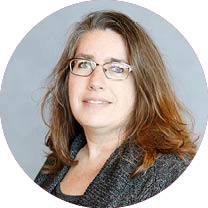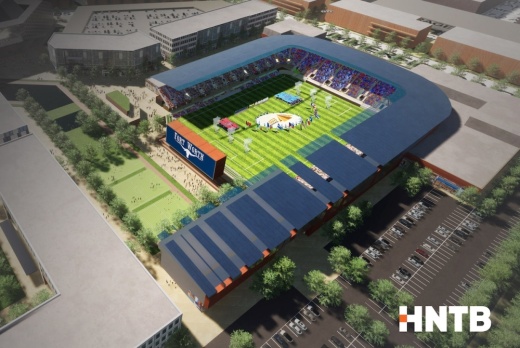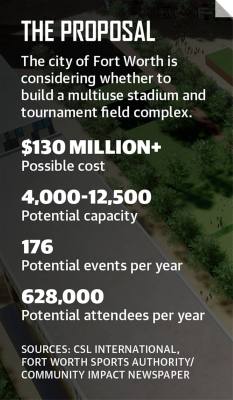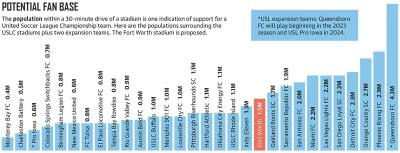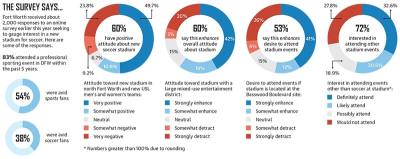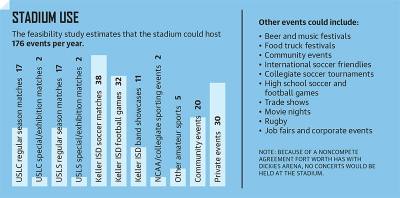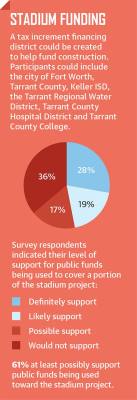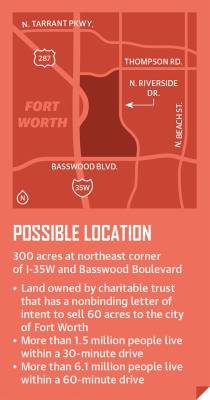Nothing has been finalized, as the city continues to study its options.
On May 10, the Fort Worth Sports Authority board voted to fund a conceptual design and cost estimate for a proposed stadium on vacant land at Basswood Boulevard and I-35W.
The city has been eyeing that site in a proposed partnership with Keller ISD and Neltex Sports Group LLC, according to the Fort Worth Sports Authority. Neltex owns franchises for professional men’s and women’s teams from the United Soccer League, a city memo stated.
Cary Moon, the District 4 City Council member who also sits on the Sports Authority board, has said such a facility could cost $130 million or more. The city is exploring the possibility of creating a tax increment financing district to help fund such a project.
Moon said some detailed negotiations still need to take place before a stadium can become a reality.
“If everybody puts their best effort forward, Fort Worth should have a very big win,” he said.
Online survey results
An online survey conducted by CSL International earlier this year was circulated by the city, the Fort Worth Chamber of Commerce and some soccer groups. That survey found public support for a multiuse stadium.
Results showed 61% of the estimated 2,000 people who responded have a positive attitude toward a new stadium in Fort Worth that would also be home to professional soccer teams.
City officials have said they are looking to use the stadium as a home base for teams with the United Soccer League, which is sanctioned by the U.S. Soccer Federation. The USL is the second tier of professional soccer after Major League Soccer. The USL Championship, or USLC, has 28 men’s teams this year with two more coming. The USL Super League is a new professional women’s league set to launch in 2023.
Fort Worth’s proposal calls for housing both a men’s team and a women’s team at the new stadium.
Feasibility study
In addition to the survey, CSL International conducted a more detailed market and financial feasibility study on behalf of the Fort Worth Sports Authority.
The study, released in March, projected that a stadium with a capacity of 10,000 at that location could have about 176 events a year with an estimated annual attendance of more than 628,000. The study recommended a combination of fixed seats and group areas. Premium seats, which include larger club seats, four-person boxes and 16-person luxury suites, were also recommended.
Brian Cohn, a project manager with CSL International, told the Sports Authority board May 10 that trends point favorably toward a stadium being built in Fort Worth.
“It’s growing over twice as fast as the United States as a whole,” he said. “It’s overall more younger, more diverse and wealthier relative to other USLC markets.”
Moving forward
The Fort Worth Sports Authority board is appointed by City Council. Its members, who act on behalf of the city, have taken the lead on studying the stadium project.
The board voted May 10 to contract with architectural firm Gensler to develop the conceptual design and cost estimates. Also part of the vote was approval to contract with civil engineering firm Dunaway to work with Gensler on estimated infrastructure expenses.
The recommended budget for these studies is $300,000, according to a city staff memo. The studies will be funded by the Fort Worth Sports Authority.
“Today’s decision means that we are conservatively considering the idea,” Board President Leonard Firestone said after the vote. “It’s appealing, but we’re trying to be disciplined about the process and give it a lot of thought and really understand the economics of it as an asset of the city effectively [and] how it’s going to serve the community.”
Firestone is also a Fort Worth City Council member serving District 7.
The Basswood Boulevard location is within the boundaries of Keller ISD, the second-largest school district in the city of Fort Worth.
“We’re continuing to have conversations with the city of Fort Worth about what that project might look like,” according to a statement released in early May by Keller ISD. “At this time, no specific details have been finalized, but we look forward to exploring what opportunities a partnership might provide for our students.”
The funding mechanism for the multiuse stadium would be a tax increment financing district, which captures the growth in property tax revenues as land is developed to finance projects within the district.
Moon said the proposed funding mechanism would mean no property tax increase for residents.
“Overall, it’s a win–win for our kids and our city,” Moon said.
Bailey Lewis contributed to this report.
Click here to read the May e-edition of Community Impact Newspaper.


